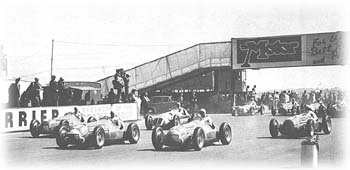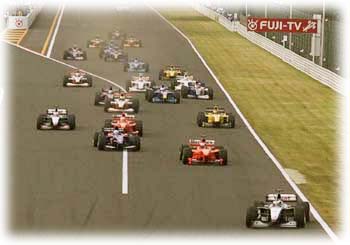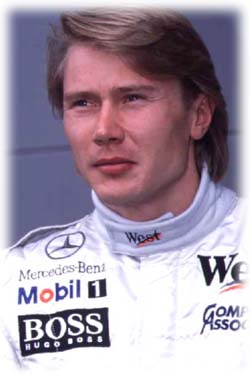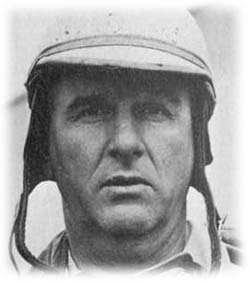|
 When Mika Hakkinen took the chequered flag to win the Japanese Grand Prix at Suzuka and so retain his world drivers' crown, fifty years of continuous competition for motorsports' ultimate title came to end. The path from Nino Farina's first world championship victory in his Alfa Romeo 158 at Silverstone in May 1950 to Hakkinen's Japanese triumph is littered with heroic deeds, glorious failures and broken dreams. When Mika Hakkinen took the chequered flag to win the Japanese Grand Prix at Suzuka and so retain his world drivers' crown, fifty years of continuous competition for motorsports' ultimate title came to end. The path from Nino Farina's first world championship victory in his Alfa Romeo 158 at Silverstone in May 1950 to Hakkinen's Japanese triumph is littered with heroic deeds, glorious failures and broken dreams.
For much of the '99 season a strange sense of unreality reigned. For when Michael Schumacher was taken out of contention by his Silverstone crash, the normal order of things was disturbed. Eddie Irvine stepped as manfully as he could into the Ferrari breach, but his title challenge was not in the same league as Schumacher's and no amount of effort on Irvine's part could make up the difference.
If the sight of the Schumacher's Ferrari buried into that Silverstone tire wall was one of the defining moments of the '99 season, so too were the opening seconds of the title-deciding Suzuka showdown, as Mika Hakkinen made one of his best ever starts to snuff out any thoughts Schumacher might have had of winning the race and thereby denying the Finn his title.  The art of making a perfect getaway in a Formula One car has not changed much down the ages. The challenge of harnessing just enough of the 800 horsepower on tap - the right amount of clutch - easing back the throttle just a fraction as the tires grip - then second gear and that wonderful sight of a clear track ahead and your rival only in your mirrors. The art of making a perfect getaway in a Formula One car has not changed much down the ages. The challenge of harnessing just enough of the 800 horsepower on tap - the right amount of clutch - easing back the throttle just a fraction as the tires grip - then second gear and that wonderful sight of a clear track ahead and your rival only in your mirrors.
This piece of racing road had of course "seen" it all before. In '96, another season-long beleaguered front-runner Damon Hill blasted away on the same side of the grid to leave his challenging teammate Jacques Villeneuve panting in his wake. The fact that both these champions managed to perform to perfection under stress levels that most can never imagine, illustrates clearer than any words or pictures, the true meaning of winning in style. Many attempt it, but few achieve it.
This Suzuka race, then, totally redeemed Mika Hakkinen's season. For the first two thirds of the year he had looked well in control. Imola apart, he mostly either won or retired. The fall-off in performance from Spa through to Malaysia together with his uncharacteristic moodiness as his season faltered raised the question of just what part of his normally well ordered life had gone wrong. For a driver in a championship fight the biggest enemy can be the one within the walls, fighting a teammate can be like guerrilla warfare. No safe retreat, the "even handed" team boss friend or foe?
For most of his time at McLaren, Hakkinen has been team chief Ron Dennis' obvious favourite. From his intervention in his favour at Jerez in '97 and again during the Melbourne "team orders" fiasco at the start of '98, it seemed that no matter how many times David Coulthard flipped the coin it always landed Hakkinen's side up. Strangely, for the weeks between the Austrian race and the season ending trip to the far east, Coulthard at McLaren could do no wrong. He spun his teammate out of the lead in Austria and days later was signed again for the 2000 season. In the Belgian race he made another first corner contact that decided the issue but Ron Dennis backed him. "If there's blame to be apportioned in that incident, then blame it on Mika and that's all there is to it," said Dennis. Even prior to the European Grand Prix, the third last event of the season, Coulthard was still confidently predicting that there would be no team orders implemented despite the fact that he was twelve points in arrears of his teammate.
Clearly Hakkinen was less than pleased with this display of apparent even-handedness on the part of his long-time mentor Ron Dennis. Rumours continue that perhaps the reason for this temporary change in the balance of power at McLaren was due in part to a pay-back by Dennis to Hakkinen for overplaying his hand during his contract renewal negotiations. Hakkinen, like other drivers in the pit-lane, had been targeted by Ford as part of their efforts to boost their driver strength for the 2000 season. That Dennis played his Coulthard card unsettled Hakkinen at a crucial time during his title challenge and the results were there for all to see.
Hakkinen also had to bear the cross that all drivers driving the best car on the grid have to suffer - that of the "automatic winner" syndrome. The pressure of expectation is in itself enormous and it has blighted many drivers' careers. If winning a championship in the best car is so easy just why has such a hugely talented driver as David Coulthard struggled so much over the past two years and just what went wrong with Heinz-Harold Frentzen - now suddenly everyone's favourite - during his '97 season with Williams? Emerging talents such as Ralf Schumacher and Rubens Barrichello may yet have their day, but excelling in a mid-field car without the pressure of expectation is one thing, delivering the goods over 16 races is quite another.
Off the track the great "barge board" fiasco put Formula One into the headlines for all the wrong reasons at a crucial time of the season, Ferrari having been disqualified from their one-two finish in Malaysia and subsequently reinstated on appeal. Without question, it put the administration of Formula One in a bad light, but fortunately it remains the exception rather than the rule.
The battle between the interest of the "sport" and the "fans" against the various sanctioning bodies is a world-wide battle and hardly any major sporting event now passes without controversy of some kind. The whole Olympic movement, that held it first games after the war in London, not far from Silverstone in 1948, was once held up as the ultimate in championing the ideals of fair competition, but is now seen clearly for what it is, just a huge money making extravaganza where the athletes struggle to get attention amongst the latest revelation of yet another rip off. For just as the fuss from the FIA's ruling in Paris was dying down came the news that somehow some 500,000 tickets due to be released to the general public by general ballot for the 2000 games to be held in Sydney, Australia, had somehow been removed to be sold as premium tickets at higher prices for corporate customers.
These incidents may be in themselves totally unconnected, but they are symptoms of the wider change that has affected sport at all levels since the perhaps more amateur and amateurish days before sport itself was an industry and the events were held for the enjoyment of both the participants and the spectators alike.
Recently we saw a re-match to decide the undisputed world heavyweight champion in the "entertainment" capital of the world Las Vegas, between Briton's Lennox Lewis and the defending champion Evander Holyfield. That the promoters were having so much trouble getting much of mainstream America to take this bout seriously is due in no small part to the farcical result when these two boxers last met earlier in the year in New York. Somehow, in a decision that even outraged the locals, their fight was voted a draw by the judges and so Holyfield retained his title. For many this was the last straw in admittedly a long line of dubious results, but the message is clear, eventually even die-hard boxing fans will cry enough once the credibility of the contest is gone.
Obviously, the administration of the FIA is on another level from the shambles that "governs" boxing, but the trust and goodwill that the sport enjoys should not be put at risk just for the needs of the revenue flow. Formula One has through most of its post war history been about technical evolution, as rival designers vie with each other to make their cars faster and win on the track. This challenge has captivated some of the best minds of their generations as men like Colin Chapman, Patrick Head, Harvey Postlethwaite and John Barnard broke new ground with their imaginations and engineering skills. That increasingly the sport's governing body appears to want to above all promote a more level-playing field at the expense of rewarding the truly innovative advance is a troubling trend.
In the USA, Nascar has enjoyed huge success by keeping the cars as equal as possible and building the "show" mentality.  There is nothing wrong with that in the Nascar context, but the history and culture of Formula One is very different and once it is no longer seen as the pinnacle of the sport, its decline into mediocrity will have started. There is nothing wrong with that in the Nascar context, but the history and culture of Formula One is very different and once it is no longer seen as the pinnacle of the sport, its decline into mediocrity will have started.
Amongst the teams the march of the motor manufacturers continues. Ford bought out the Stewart (soon to be Jaguar) team, Honda return with the British American Racing team and BMW will soon be both powering and sponsoring the Williams team. The dramatic improvement of the Stewart-Ford team in finishing fourth in the constructors' table from their '98 eighth place finish was largely due to the improvement of their Cosworth built engine. The difference in attitude from Cosworth, from building and supplying an engine to a price as a contractor, to building an engine to win as a fully owned part of the team, was another lesson - if one was still needed - that the level of competition is now so high that only the very best will do to win in modern Formula One.
It is likely that the troubles which so dogged BAR team will continue next season. Given that the two most successful Formula One outfits in recent decades (Williams and McLaren) are ruled by strong minded individuals whose word in their organisations is law, one has only to look at the cast of characters currently involved in the BAR-Honda project (or should that be Honda-BAR, or Honda-Honda?) to predict more conflicts in the future. The whole history of Honda's return to Formula One has been a story of internal division and conflicting interests. With two of the founders of BAR, Craig Pollock and Adrian Reynard at loggerheads over the management of the team and the public position of the team's star driver Jacques Villeneuve having effectively backed himself into a corner by his support for Pollock, then one gets the feeling that the BAR team is unlikely to be a happy or united one any time soon.
The make-up of the BAR outfit going into this new season is typical of the new structure on show going into the new century. A businessman-entrepreneur at its head, with a racer-entrepreneur as its heart, a major motor manufacturer as its engine supplier and partner and the whole enterprise bank-rolled by a major tobacco company.  Eager and willing to spend a vast amount of money for the publicity value that can be garnered from participation in the travelling circus that is Formula One. The fact that this works for all concerned is largely due to the inspiration and vision of Bernie Ecclestone, founder and owner of Formula One Administration, the company that owns the rights to the sports world-wide television revenues. Just prior to title deciding Japanese Grand Prix Ecclestone made a deal which will see him eventually sell off 50% of the equity in his company for some $1.3 billion. His vision and foresight rewarded. Eager and willing to spend a vast amount of money for the publicity value that can be garnered from participation in the travelling circus that is Formula One. The fact that this works for all concerned is largely due to the inspiration and vision of Bernie Ecclestone, founder and owner of Formula One Administration, the company that owns the rights to the sports world-wide television revenues. Just prior to title deciding Japanese Grand Prix Ecclestone made a deal which will see him eventually sell off 50% of the equity in his company for some $1.3 billion. His vision and foresight rewarded.
Just what Nino Farina and his contemporaries would have made of all this is impossible to say. One of Formula One's leading lights once observed, perhaps somewhat whimsically that, "it's now only a sport between 2 and 4 on Sunday afternoons, all the rest is business." Obviously, times have changed and the world with it during the last fifty years. Just let us hope that when reviews are written on the 2049 season, the "sport" element of the Formula One industry - already such a minute but vital percentage of the whole scene - will have survived.
| 
